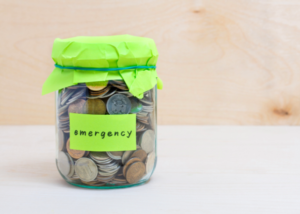 What is an Emergency Fund?
What is an Emergency Fund?
Life is full of surprises, and in particular, financial surprises. Unexpected bills are one of the top reasons that family budgets go into a tailspin leading to - in many cases - long-term debt problems.
One way to combat these nasty surprises is to build a financial 'buffer' in the form of an Emergency Fund, which is a sum of money, separate from other savings, that you can turn to in times of trouble.
You can select one of a number of different types of savings accounts to hold your emergency fund, but you should ensure that the account provides you with the appropriate ability to access your fund should you have an emergency. You will find a wide variety of savings accounts regularly updated in our article, "Best savings accounts in the UK".
Why is an Emergency Fund important?
Helps smooth out your budget
If unexpected expenses come up, they can create havoc with your budget. With an Emergency Fund, you can pay the bill immediately and replenish the fund over time.
Prevents debt
An emergency fund is available where you may have previously resorted to a credit card to pay an unexpected bill. This means that although you may deplete some of your savings, you will not pay interest on the money that you would have otherwise spent on a credit card.
Lets you get ahead
Playing financial catch-up is very demotivating but access to an Emergency Fund can get you ahead of your bills, paying them as they arise.
How can I save when I have no spare income?
We often feel we have no spare money, but if we closely analyse our spending, we can find savings even if they are small.
Here are some ideas:
- Walk to work or, if this is not possible, walk part of the way to reduce your travel spending
- Take a packed lunch to work to save money on daily shop-bought lunches
- Stop buying coffee - one coffee every working day will set you back around £80 every month
- Cancel magazine subscriptions
- Get a smaller car that is cheaper to run
- Cancel your Sky subscription - you can still access a number of channels on Freeview but don't forget you will still need a TV licence
How to start building an emergency fund
1. Calculate how much you need in your Emergency Fund
Three months' net income is a good starter, but don't be worried if this figure seems unobtainable. You will be surprised how quickly it will build.
2. Treat your Emergency Fund savings as if it was a bill
Make these payments non-negotiable and make sure you put this money aside every month ahead of everything but your mortgage/rent. Making a direct debit payment into a separate bank account will ensure your Emergency Fund is kept separate from any other money.
3. Put any spare money each month into your Emergency Fund
If you get a bonus or some overtime money, put this into your Emergency Fund along with any unspent money from your monthly budget.
4. Download a budgeting app
Use a budgeting app to highlight your spending pattern and identify areas where you can save - check out our article 'The best budgeting apps in the UK: How to budget without even trying'.
Summary
Building an Emergency Budget is one of the major steps to financial freedom, and trying to live without one is like trying to walk a tightrope without a safety net. Set your goal and put all your efforts into achieving it and you will feel the warm glow of being in control of your finances.

 What is an Emergency Fund?
What is an Emergency Fund?



